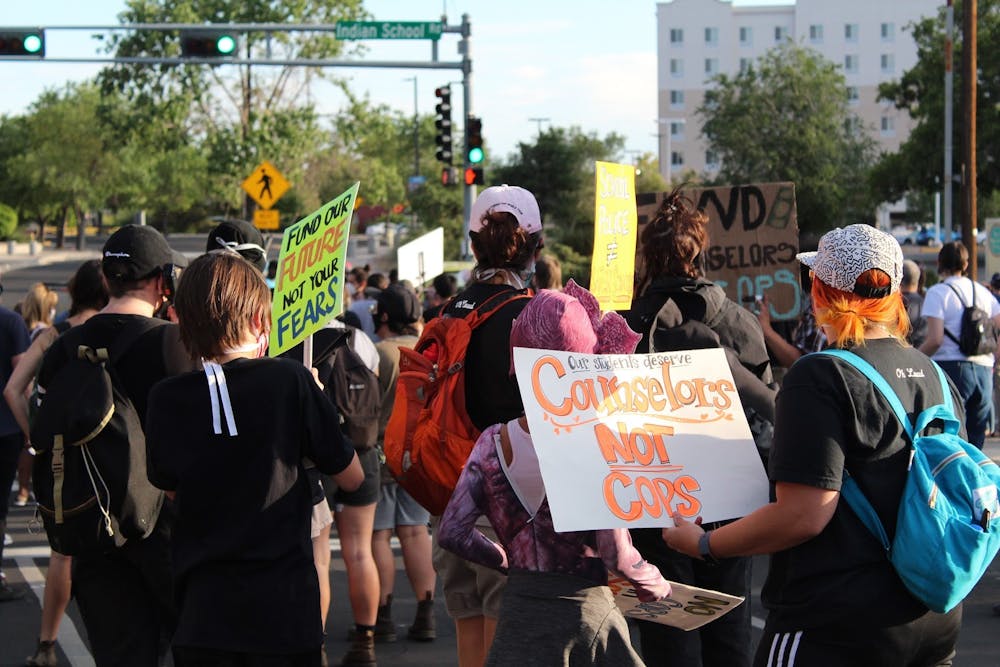Nearly 150 young people, students, teachers and community members demanded Albuquerque Public Schools (APS) defund its police department during a protest outside of APS headquarters on Saturday evening.
Organizers said police departments in school systems contribute to the criminalization of Black and Brown communities and aggravate the school-to-prison pipeline.
“We are out here to demand the defunding and abolishment of the APS Police Department,” Fight For Our Lives organizer and leader Zoey Craft said.
Monica Armenta, a spokesperson with the APS superintendent’s office, said Albuquerque Public Schools “understands many of (our) students and their families experience public education through a lens not always understood by all, and (they) will continue to do what they can to eradicate racism where it exists” in a statement to the Daily Lobo.
Armenta said the APS Police Department does “not operate in isolation” and all officers undergo restorative justice training with the expectation to use arrests as a “last resort.”
The APS budget for the 2019-20 school year totaled more than $1.4 billion with nearly $7.5 million of those funds directed to the APS Police Department budget.
The Department of Justice conducted investigations into Albuquerque Public Schools in 2017, when the school system was suspected of targeting minority students and severe punishment tactics.
APS maintains that “whenever possible we will attempt to use mediation, counseling and mentoring in lieu of enforcement action,” according to APS police budget documents released this year. However, Isabella Baker, a University of New Mexico student and organizer at the Learning Alliance of New Mexico, dismissed those as empty words.
“Police in schools cause a further criminalization of students, and particularly students of color,” Baker told the Daily Lobo.
The Learning Alliance of New Mexico is a grassroots, youth-led organization that “believes that the children of New Mexico should have access to the best education possible.”
Part of providing that education, Baker said, includes removing police from schools.
Schools are an essential part of all communities, and police presence has resulted in students feeling “unsafe, on edge and uncomfortable in places that are supposed to be meant for them,” according to Baker.
Get content from The Daily Lobo delivered to your inbox
The Denver School Board recently voted to remove police from their school system altogether.
Baker has worked with many students that have experienced violence at the hands of school police, particularly students that suffer from mental health issues.
According to Baker, students have spoken with her about the “inappropriate treatment of students in crisis from the school police, such as holding them up against the wall or throwing them on the ground.”
Learning Alliance has provided anti-racism training to the APS Police Department, but while the force has said it’s interested in more restorative justice practices, Baker said APS police have yet to make any substantive changes.
”It takes more than one hour of anti-racism training to change the system,” she said.
The negative effects of police presence in school systems goes beyond classroom interactions. Research by the Justice Policy Institute suggests that the presence of police in the classroom leads to the criminalization of students of color and the creation of a school-to-prison pipeline, wherein small infractions or racial biases or stereotypes in school lead to students being put into the criminal justice system.
The Justice Policy Institute found that “when schools have law enforcement on site, students are more likely to get arrested by police instead of having discipline handled by school officials.”
Additionally, the American Civil Liberties Union found that Black students are three times more likely to face suspension or expulsion than their white peers.
In 2017, the National Black Women’s Justice Institute analyzed U.S. Department of Education data and found that nationally, “Black girls were over seven times more likely than white girls to receive one or more out-of-school suspension.”
UNM assistant professor Shiv Desai, a former public school teacher who teaches in the College of Education, said that through his work with the New Mexico Youth Alliance’s Juvenile Justice Council he has witnessed the devastating effects of the school-to-prison pipeline among New Mexico youth.
“A lot of times, kids become system-involved, not necessarily for major violations, but violations like disrespect or noncompliance,” Desai said.
Desai went on to explain that the data shows that children typically do not warrant law enforcement intervention.
“If you look in every single category, kids are not violent,” Desai said.
Desai also said that police and current school discipline policies disproportionately affect students of color.
“There are implicit biases that not only police officers have, but teachers too,” he said “It’s called the criminogenic gaze, where race and gender affect the viewer. In this case, students of color have this gaze placed on them because of larger societal issues.”
Researchers have reported that the overuse of suspensions and expulsions has contributed significantly to dropout rates and the perpetuation of the school-to-prison pipeline, according to the Learning Policy Institute.
“What you see now is an overreliance on school suspensions and expulsions. Now urban, inner city schools are not institutions of learning and hope but oppression and suppression,” Desia said.
Schools are like “prisons with metal detectors, drug sniffing dogs and police,” he added.
In order to remedy the disproportionate entrapment of students of color with the criminal justice system, Desai expressed that discipline in the school system should be entirely reimagined. From teachers to administration, all parties involved in K-12 education should be trained in restorative justice models, he said.
Including ethnic studies and other culturally focused courses are essential to moving forward to end the school-to-prison pipeline and embedding anti-racism into school systems, according to Desai. The demands given at the Saturday protest also expressed the same urgency.
“We have to incorporate a restorative justice model to help students learn from their mistakes and move forward, because our young people deserve better,” Baker said.
Genevieve Romero is a freelance reporter at the Daily Lobo. She can be contacted at news@dailylobo.com or on Twitter @Vieve2020






